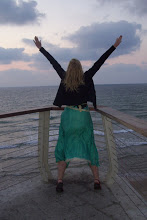- Should I be doing more?
- Can I be doing more?
- Arabic is my first acquired language.
- I'm still me-as-a-speaker in Arabic, and I don't know why I'm surprised.
Furthermore, the cognitive dissonance that results from telling my pre-med colleagues that I care more for Arabic than organic chemistry (true) and then turning around and telling my Arabic colleagues that I feel okay with my proficiency because it's not my major and I'm going to med school anyway (...true?) is almost more than I can handle.
I don't know what I am, and I don't know what I want to be.
Am I sacrificing a valuable degree in the hard sciences for mediocrity in a language others will always know better than I? The fact remains that I'm not a native speaker and therefore am not as valuable a linguist. Language, though, does not have to be put to external use. If I want I can spend time throughout my whole life learning to read contemporary Arabic literature or studying grammar and usage for my very own fulfillment. Academia is suffocating and I don't want to spend my life convincing myself that documenting the nuances of allophonic variation in Dialect X OR the subtle antigenic variation in Obscure Disease X actually matters.
I
DON'T
KNOW
WHAT
I
WANT.
But right now, as a serious premedical student and a serious language learner, I need to remember that:
1) I will consistently try to do my best for myself and for no one else
2) My best is good enough for me
3) It's okay if my best does not equal the best
4) I can be proud of what I can do and do not have to preoccupy myself with what I can't do
5) A 4.0 GPA can't last forever (and according to admissions statistics, nor should it)
5) A 4.0 GPA can't last forever (and according to admissions statistics, nor should it)
6) Everything will work out in the end
D&C 90:24: "Search diligently, pray always, and be believing, and all things will work together for thy good, if ye walk uprightly and remember the covenant wherewith ye have covenanted one with another."
Now that I think (I hope) I can do.


3 comments:
If I can throw my two cents in...fluency will come quickly on study abroad. You'll end up reinforcing grammar or vocabulary principles if you commit to the classes, but being able to speak quickly and with a high degree of fluency was the number one, most important skill I developed during my time in Egypt.
PS Have you talked to Kirk Belnap yet? He's a linguistics/Arabic professor who is always working on new research projects. While we were in Egypt he visited and administered tests and interviews aimed at determining the psychology behind language learning in an immersion context. If that's what you're interested in, it's worth getting involved in.
PPS (again, I'm sorry) You're not the only one who feels inadequate. Try taking a break from Arabic for more than 3 months and you'll know how I feel...
Post a Comment